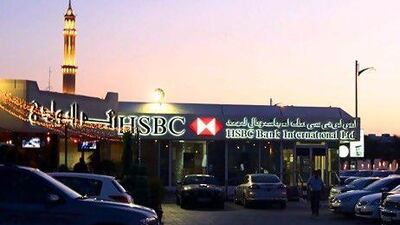Being Lebanese can be a bit of a burden at times. Just ask my wife, who when applying for a visa to travel to the United Kingdom with her British husband, to stay with her British sister-in-law, had to show a letter of "invitation". Apparently, there are also new, tighter residence rules for foreigners married to UK citizens, and this is making Mrs Karam twitchy, given events in Lebanon in recent weeks.
The Internal Revenue Service (IRS) in the United States has also been on the warpath, making sure that Lebanese with US nationality can't hide anything from the US taxman. It is all part of something called the Foreign Account Tax Compliance Act, or FATCA, which according to the IRS website is part of "US efforts to improve tax compliance involving foreign financial assets and offshore accounts".
To do this, the IRS will eventually ask Lebanese banks to compel American customers to waive their right to Lebanese banking secrecy, or as FATCA puts it, "require foreign financial institutions to report directly to the IRS information about financial accounts held by US taxpayers". If any Lebanese bank doesn't do this, 30 per cent of that bank's US business would be at risk of being frozen.
"It's a complete abuse of power," says a Lebanese-American friend who now has to expose her financial affairs to the IRS and may have to pay a ruinous fine. The kicker is that not only is she liable to be investigated but that the assets of her German husband, with whom she has a joint account, will also be subject to scrutiny.
I have it on good authority that many Lebanese are now considering giving up their American citizenship. Anyone who knows how the Lebanese covet a foreign passport, especially one from a blue-chip nation like the US, will know that it is a decision that will not be taken lightly.
And so there I was thanking my lucky stars that I was born under the protection of Her Britannic Majesty, able to travel the world "without let or hindrance".
My wife may, every now and then, take issue with the British Foreign and Commonwealth Office, but as we sat on our Beirut balcony the other night I reminded her that at least we don't have the Americans demanding a slice of what I earn, irrespective of where I live.
The British, I assured her, were different.
I then applied to open a UK bank account. I don't live in Britain but I do own a house there and wanted the account so that rent from my property could be paid without paying overseas transfer charges. Furthermore, and at the risk of sounding a bit flash, I am an HSBC "premier" customer, a status that they assure you makes you one of the most pampered people on Earth.
"It's going to be tricky," said my account manager, sucking in air through her teeth. "[The British] are very funny about Lebanon and money laundering. Many of our premier customers have tried and failed."
I reminded her that I was an Englishman and that they would surely look at my case more sympathetically. "Well if you are going to the UK, why not try from that end," she said.
And so it came to pass that a few weeks ago I sat in the office of a very nice young man at the HSBC in London's King's Road.
He dutifully scanned my documents and murmured and nodded and said it shouldn't be a problem. I owned a home, I had a utility bill and "after all sir, you are a premier customer".
As I walked out into the May heatwave, my faith in the country of my birth was as rock solid as it ever was. The application was refused. The nice young man, clearly schooled in defusing customer anger, simply said a letter had been sent explaining the reasons.
Mrs Karam is not surprised.
Michael Karam is associate editor in chief of Executive, a regional business magazine based in Lebanon
twitter: Follow and share our breaking business news. Follow us
iPad users can follow our twitterfeed via Flipboard - just search for Ind_Insights on the app.

